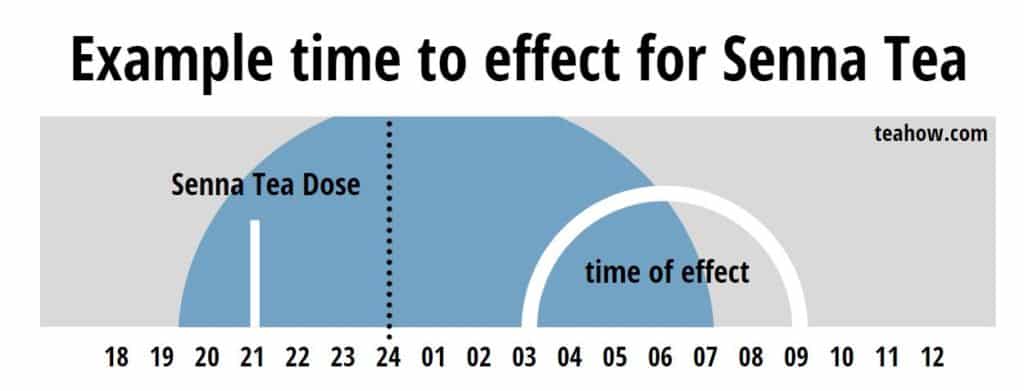Often we look to tea to provide a remedy for some ailments, mostly minor and some serious. One of those is Senna, and in particular, Senna tea is a way of consuming Senna. But when do you take it? Here’s information about Senna tea, when to take it, and why, as well as the benefits and side effects.
But first, here’s a quick answer, then we’ll get into more details…
What Is Senna Tea? Senna tea is a herbal drink, made from the Senna plant (a genus of flowering plants in the legume family) and more often from the Cassia acutifolia or Cassia Angustifolia Senna variety. It has a bittersweet flavor with little aroma.15-30 mg of Senna in a cup of tea is a healthy dose for a day.
That’s the short answer, but there’s plenty more to Senna than that, so let’s get into some of the details, starting with what is Senna tea…
What is Senna tea?
Senna is actually a not so popular tea for many of us. The reason for this is mainly because of the active ingredient in a Senna tea, which is Senna.
It’s available in liquid, powder, and even tablet form. Because of these alternative forms, the popularity of Senna as tea is rather less popular.
As we mentioned earlier, Senna of all mediums is made using the leaves of the Senna plant. The Senna plant is a large genus of the flowering plants in the legume family.

Typically Senna tea is made from the Senna variety Cassia acutifolia or Cassia Angustifolia, which are both cultivated in India and the middle-east.
Where is Senna grown?
The Senna plant is native to Egypt and is now cultivated in countries like India, Somalia, and Middle-east. But it grows naturally worldwide, mainly in the hotter regions.
Properties in Senna tea
Senna tea is not a true tea variety as it’s not made from the true tea plant, “Camellia Sinensis”.
So its properties are not as close to true tea varieties such as black, green, white, or oolong tea.
And Senna is actually a herb, which makes Senna tea more of a herbal drink – with herbal properties.
In ancient times Senna tea was used as a herbal treatment for several medical conditions for its herbal properties alone.
Alongside this, Senna tea is well renowned for its laxative properties, anti-inflammatory, and antiparasitic properties, as is found in some other herbal teas.
This is also why Senna has been used as a laxative agent in many herbal medications.
Senna tea also exhibits certain stimulant properties just like the caffeine effect in many other true tea varieties.
The flavor profile of Senna tea
Senna tea has a flavor profile that is a blend of slightly sweet with bitter undertones.
Also, unlike many other herbal tea varieties, Senna tea does not have a very appealing aroma or even an aroma of its own.
Because of this reason many commercial teas combine other herbs with Senna tea to give it a more attractive aroma and flavor profile.
However, this flavor may vary depending on the brand of the tea, the quality of the tea, and other added ingredients.
Some also add sweeteners and other true tea varieties such as green tea to offer the drinker a more palatable flavor.
The recommended dosage of Senna tea
There is no clear dosing recommended for Senna tea. Firstly, this is because many of the commercial Senna teas have a blend of other herbs. This makes it difficult to identify how much of Senna tea has been used and so the recommended dose is never reliable.
Secondly, the dose of Senna varies dramatically unlike other teas when it comes to how long you steep your tea.
On average, any Senna based drink like Senna tea should be limited to 15-30 mg of Senna for a day.
Experts also advise that you should not take a dose of Senna which is more than 34.4 mg daily as it can lead to side effects.
For elderly people, the dosage is limited to 17 mg daily. And for constipation following pregnancy, the dosage should be limited to 28 mg in two divided doses.
Sticking to the recommended dosage is very important when it comes to Senna tea. This is because, in 2005, a 52 woman suffered from acute liver failure.
When analyzing her diet, it was seen that she ingested one liter of Senna tea every day for more than three years. The report determined that her daily ingestion of excessive Senna tea (far more than the recommended dosage) was likely the result of her acute liver failure.
So when taking Senna tea make sure you’re sticking to the recommended dosage.
If you can’t measure this out precisely, follow the instructions given on the packaging as it is. The packaging should provide an accurate and healthy dosage and steeping time.
Why take Senna at night
Senna tea works as a laxative within 6-12 hours of consuming it, so it’s often taken before going to bed so that it can work overnight. Taking Senna tea at night can have the desired effect of relieving constipation the next day.
So it’s as much a question of how long does senna tea take to work.
Drinking Senna tea at night, if done correctly, should culminate in the urge to go to the toilet during the next morning – hence 6-12 hours later.
Below is an example of taking senna tea at 9 pm and when you can expect the process to begin working. during the night

However, if you take the recommended dosage and it doesn’t work for the reason you’re taking it, then do not increase the dose.
Before taking Senna tea at night, be sure you have a fundamentally good reason to take it. Senna tea may be a natural remedy, but it can be a potent one, so it’s worth consulting your doctor before taking Senna tea as it’s worth discussing the reasons and alternatives with a professional.
The guidelines recommend that you do not take senna for more than 1 week without talking to your doctor beforehand.
This can result in unwanted and fatal side effects.
Before taking Senna tea at night
Firstly, obtain a list of the ingredients so you know what Senna tea contains
Allergies can be important when taking Senna tea, this is probably even more so when taking at night.
So inform your doctor and pharmacist if you’re allergic to senna, if you’re not sure, then your doctor will be able to assist you with finding out.
When purchasing Senna tea, ask your pharmacist or doctor about any interactions with other medications you may be on, or if any of the ingredients might have a detrimental effect on your health.
Discuss with your doctor and pharmacist any prescription and nonprescription medications, supplements and vitamins, mineral oil laxatives, or any other herbal products you’re taking as this can have an effect.
For example, if you’re taking, or plan to take Blue tea or Catherine tea for similar or related purposes, then adding Senna tea could make a significant and detrimental impact on your health.
Tell your doctor if you become pregnant, or if you’re planning to while taking Senna. Do not take Senna tea while breastfeeding.
And older adults 65+ should be cautious about prolonged use of Senna. Again consult with your doctor on this point.
When taking Senna tea at night – or at other times, then inform your doctor about any of the following side effects if they are above what you would consider mild side effects:-
- Stomach pains or stomach cramps
- Nausea
- Vomiting
- Diarrhea
- A change in bowel movements for more than 2 weeks
See the more complete list of side effects below.
When it comes to the question of why take senna tea at night, talk to your doctor about the best times for you to take it based on your own health status, and the possible risks and benefits of taking senna tea.
Can you take Senna during the day?
Ideally, you need to take Senna tea before you go to bed so that the effects can work the best overnight. Gauge the time at which you take the tea and wake up, and only ever take the dose recommended by your doctor.
Where to buy Senna Tea
If speaking to your doctor regarding this, the FDA has approved Senna as a prescription medication, so that is one route. But, if you’re looking to buy Senna tea and are using it responsibly, then there are a few options…
You may find a loose leaf tea store that sells it locally, or you may find it in specialist herbal and nutritional remedy stores.
You can also buy Senna tea from Amazon and make a start by trying Senna tea in the bags. I’d recommend starting with this Senna tea option.
If you want to go a step further, then you can always go for Senna leaves. I’d recommend starting with these Senna leaves on Amazon.
How to make Senna tea
Once you buy your Senna tea, and if you’re using Senna tea bags, then follow the instructions on the packaging.
Alternatively, if you’re making Senna tea from scratch or using store-bought loose Senna tea leaves, then prepare it as follows:
- Add 1-2 grams of dried Senna leaves in one cup of hot water (not boiling).
- Steep for no more than 10 minutes maximum.
- Add any sweeteners of your choice and/or other tea varieties for added flavor.
- Serve in a teacup and you’re ready to go.
Benefits of Senna tea
Senna tea has historically been used for a variety of health conditions.
However, we should state that Senna tea and potential uses have no real established studies. Only very few studies have looked at the potential health benefits of drinking Senna tea. That being said, let’s look at the possible benefits of Senna tea
Below are some of the potential health benefits of Senna tea.
- Relieve constipation (One main use of Senna tea, since ancient times)
- Weight loss
- Promote detoxification (which helps weight loss)
- Reduce body fat and thereby weight loss (this is possible because of the laxative properties of Senna tea. And such weight loss from laxatives aren’t considered healthy).
- Gastrointestinal disorders
- Increases fluid in the intestines and softens stool
- Irritable bowel syndrome (IBS)
- Bloating
- Colonoscopy Prep or before undergoing Colonoscopy (Colonoscopy is a famous medical procedure used for screening colon cancer)
Side effects of Senna tea
Before talking about side effects, the following people should avoid drinking Senna tea.
- Dehydration
- Abdominal pain
- A condition that causes intestinal obstruction
- Any type of heart, liver, or kidney condition
- Intestinal obstruction
- Ulcerative colitis
- Crohn’s disease
- Appendicitis
- Diarrhea
- Heart disease
- Children under the age of 2 years should not use Senna
Side effects of drinking Senna tea may start mildly, some of the mild side effects of Senna tea are as follows:
- diarrhea
- cramping
- fluid loss
- abdominal pain
- electrolyte disturbances
- feeling faint
- nausea
- vomiting
- stomach discomfort
These side effects can severe if you take high doses of Senna for a long period. Such severe side effects include coma, nerve damage, liver damage, and changes in heart rhythm.
Apart from this, the long-term use of Senna tea can cause dependence to have a bowel movement on its own, finger clubbing (usually reversible), and rectal bleeding.
Leaving aside side effects, Senna tea can interact with several medications. So make sure you consult your doctor if you want to drink Senna tea with the medications your taking.
So finally…
I hope this has helped you with the question of why take senna t night, or how much to take and the benefits and side effects. Don’t forget to check out my tea-wares page for my recommended tea-head products!
